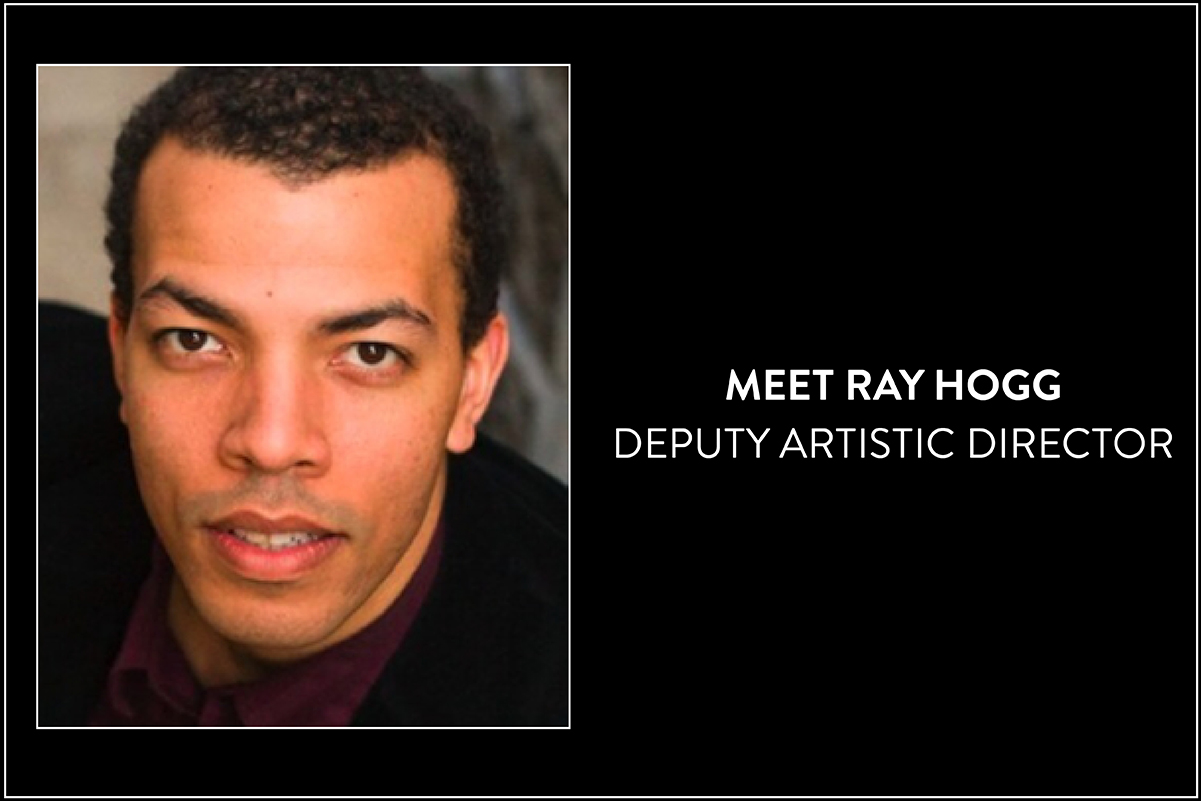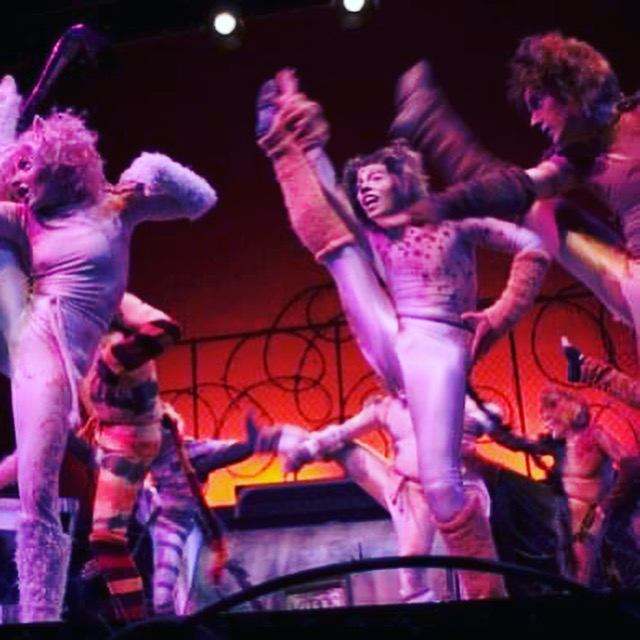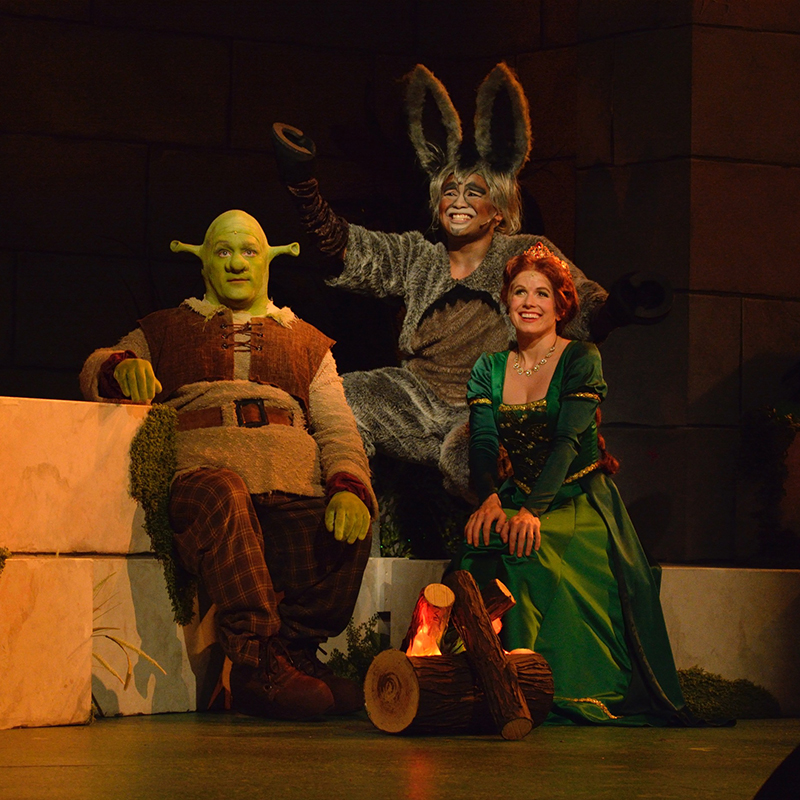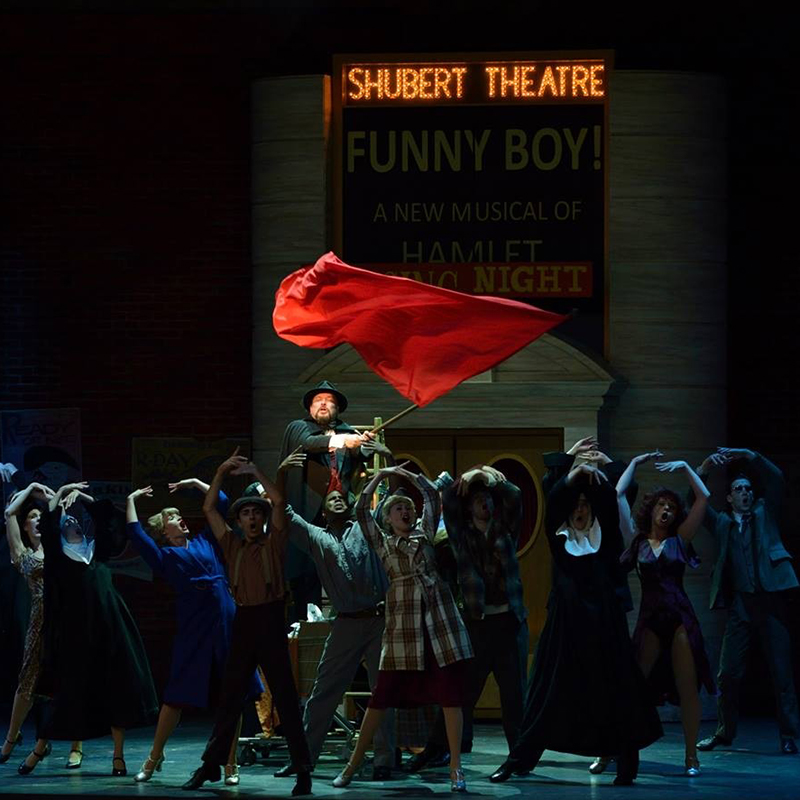
MEET RAY HOGG, OUR DEPUTY ARTISTIC DIRECTOR
This week, we sat down to chat with our newest staff member, Ray Hogg. Ray joins The Musical Stage Company as Deputy Artistic Director following an illustrious career as a performer, director, and artistic director across Canada. Read on to find out what sparked his love of musical theatre, what drives him as an arts leader, and what he’s most excited to accomplish at The Musical Stage Company.
What experience made you realize that musical theatre was your passion?
The very first musical I saw was the first Canadian touring company of CATS at Theatre St. Denis in Montreal (my hometown). From the moment I walked in the doors and took in John Napier’s incredible set I was hooked. The thrill-o-meter went up and up and up as excitement of the overture, the wild capers of the cast, and the awe-inspiring synthesis of dance, poetry, fantasy, and music washed over me. Seeing that show was an experience – all of my senses were electrified.
What is your favourite musical?
There are too many to just choose one! I love DREAMGIRLS for its structure; the pace is unbelievable – the show MOVES! I can’t get enough of Lippa’s THE WILD PARTY for the music; nothing makes me feel more things than those dirty trumpet notes that open the show and are reprised at the top of Juggernaut. I haven’t been speechless since I saw HERE LIES LOVE at The Public Theatre. I was gobsmacked by the innovation and representation; my heart sang with pride at the all-Fillipinx cast, and my mind was blown by the beautiful staging, concept, and fun of the entire experience. I adore THE PRODUCERS for its audacity; the sheer nerve of Mel Brooks’ story makes me gasp, giggle, and guffaw…I’m obsessed with SISTER ACT because it’s the brainchild of a Black woman that celebrates the joy and vitality of Black women, Black love, and a Black hero front and centre in the story. Also, I live for magical costume quick changes in full view of the audience (SISTER ACT features several, each funnier than the last). And finally I owe my career to CATS. The show literally changed the course of my life four times:
- As a child, seeing CATS inspired me to pursue theatre as a hobby
- As a teen, wanting to be in CATS one day inspired me to pursue dance as a professional
- As an mid-career concert dancer, performing in a first-class production of CATS inspired me to pivot from concert dance to music theatre performance
- As a director, remounting CATS introduced me to Rainbow Stage (where the leadership phase of my career was formalized)

What’s your favourite musical project you’d been a part of?
Oh boy… this feels like Sophie’s choice!
As an actor it’s a tie between CATS and MY ONE AND ONLY. Cats because half of the show is improvised. You’d be told in rehearsal “okay, you have 32 measures to get from extreme stage left to extreme stage right – make sure that you don’t pull focus, stay embodied in character, and be certain to interact with your tribe as you make your way over there.” I had never before or since experienced the amount of freedom as a performer to “choose my own adventure” in order to make the show fresh and new every night. It was a revelation…
MY ONE AND ONLY stretched me as a performer and taught me to dig deep to find stamina, creativity, and confidence in new skills. Not only did I learn how to tap dance for that show, but I was also featured as a part of a quirky barbershop trio alongside Kyle Blair and Julius Sermonia (musical theatre ROYALTY, as far as I’m concerned). We served as a kind of comedic greek chorus/narrators for the entire piece. I think in the whole 90-minute play we were off stage for a total of 25 minutes – 15 of those minutes were intermission, the other 10 were quicker than quick costume changes. The entire process, led by director Michael Lichetfeld, was of joyful discovery. We were in pursuit of zany fun and extreme happiness the whole time (oh, and because it was at the Stratford Festival, Johnny Depp’s tailor made all four of my suits! I mean, how cool is that?!?)
As a director, hands down, SHREK THE MUSICAL. The scale of the show is enormous! I was working with a massive and incredible creative team that included Kimberly Rampersad, Anthony Bastianon, Scott Penner, Scott Henderson, Sam Manchulenko, Evan Klassen, Leslie Watson, Ali Fulmyk, Brett Mikulik, Rebekah Jones, Catherine Wreford, and Rachel Cameron. I invited 18 children to work with our cast of 20 adults as a children’s chorus. The central theme of the show rested on Shrek’s line “People take one look at me and go “Arrrgh! Help! Run! A big stupid ugly ogre!” They judge me before they even know me.” I wanted to really dig into this statement, which in my opinion perfectly encapsulates the plight of Black people in North America then and now. In my efforts to help the young cast members understand why the fairytale creatures staged a rebellion against the ruling class I felt it was important that we not shy away from the “Black Experience.” One day, following a very frank and open discussion we had with the children about bias, bigotry, and the ugly after-effects, one of our Black cast members insisted that having Kimberley and me at the helm of the show was revolutionary. As a Black woman, she had never been in a rehearsal room in which she felt safe, seen, listened to, and valued. We talk a lot about the transformative power of the arts on our audience, but in the instance of that production of Shrek I participated in the transformative power of the arts on artists! It was a thrilling experience.

What are you most looking forward to as the Deputy Artistic Director of The Musical Stage Company?
I am really excited to work hand-in-hand with Mitchell Marcus developing new artists, works, and seasons by:
- Creating pathways that introduce new artists to The Musical Stage Company
- Nurturing the growth and development of exceptional young-in-experience artists
- Working with community stakeholders at audience design – the active recruitment of the audience that needs to engage with our programming. In other words, outreach tailor made to enrich the lives of audiences who might not ordinarily attend one of our performances – but that should!
- Providing opportunities for BIPOC and other marginalized artists to develop and thrive within The Musical Stage Company family.
You’ve worked as an actor, choreographer, director and artistic director. What’s the skill you find yourself relying on the most across each of those positions?
Care. I care so deeply about the theatre. I care about the stories we tell, the reasons we are telling them, the audiences we are telling them to, and the artists who are doing the telling.
Humour. If we can’t find the lightness in what we are doing what’s the point? Also bringing joy, a sense of fun, and levity to the table makes the incredibly hard work and difficult themes that we inhabit easier to manage.
What inspired you to wear so many hats in the performing arts?
CATS.
Just kidding, but I felt like I had to bring back the whole CATS thing for a minute…
I wear so many hats because of my least favorite word. It’s my least favorite word because it is overused to describe mundane states of being. Ready for it? Here we go! The word is “passion”. I’ve heard people use passion to describe how they feel about bundt cake or in which order milk and tea should go into a cup. No offense meant to my tea and cake loving brethren and sistren, but I think of passion as a burning desire, or an undeniable compulsion to do something (usually that something is illogical and irrational).
Like ice-climbing.
Ice-climbing makes no sense. The only people who willingly go out in search of cold, weepy, slippery, scary frozen cliffs to climb are the people who are passionate about ice-climbing. Scuba-diving is another example. What person casually straps 50 pounds of gear on their back and then heads for the bottom of the ocean for a sight-seeing trip?!?!? A person who is passionate about the seafloor, that’s who. I am neither passionate about ice nor sharks, but I am passionate about the impact that arts and culture can have on all people.
I have never met someone who was angry because a painting, a poem, or a song inspired them to be a better person. Never. I have also never known a so-so painting, poem, or song to be inspirational. My passion for theatre and the good that it does in the world is the engine that drives my many-hat-wearing self to seek out and nurture excellence (and propel it towards the stage).
I suppose you could say I wear so many hats because I am passionate about arts and culture and I am compulsive about helping.
I live a life of service to the community. I am driven to connect donors with cultural causes that scratch their philanthropic itch. I feel a compulsion to help artists in my community find and amplify their artistic voices. I feel duty-bound to spread the life enriching benefits of arts and culture to as wide a constituency as possible…That means doing everything in my power to ensure that the artists and the works that we promote onto our stages are representative of the world that I grew up in and currently inhabit. Spoiler alert, I grew up in a world surrounded by people of colour who are CEO’s, doctors, lawyers, heroes, romantics, leaders, inventors, and living descendants of royalty. I grew up in a world where “womyn-ah-run-tings” and “sistren” were embroidered on pillow-cases and wall hangings to serve as reminders to our household to celebrate the power that lives in women. I grew up in a world where everybody was offered a seat at the table so long as they had something to contribute to the meal…I grew up in a world that exhorted me to be prepared and to leave the world a better place than I found it.
How does your experience as an artist inform your work when you’re on the other side of the table?
I will never forget how hard it is to be an artist. Not only does the work demand that you be willing to visit, confront, and inhabit the most painful, vulnerable, and unlikable aspects of yourself, but it also asks you to share that inner life openly and honestly with strangers (see above re: passion). I will never forget the crippling self-doubt that all artists live with, nor will I ever cease being in awe of the strength that artists possess which allows them to overcome those feelings and quite literally “put themselves out there.”
I will never forget that the hardest work is often the quietest work.
I will never forget that artists are, by nature, rebellious. Their job is to question and to forge their own way of doing things. I will never forget that, despite doing work that demands a child-like willingness to explore and play, artists are grown men and women who have thoughts, feelings, partners, children, families and very important lives outside of the theatre.
I will never forget that dancers’ work is not only harder than any other work in the world (sorry firefighters, metal workers, and roofers – dancers have you beat), but that it is also the most divinely inspired work. Martha Graham said it best: “wherever a dancer stands ready, that spot is holy ground…”

You recently started Prime Mover Theatre Company, a company dedicated to the advancement of marginalized artistic voices through advocacy, artist training, and large-scale co-production. What are your plans for the company, and why did you choose this moment to launch?
Thank you for mentioning Prime Mover Theatre Company. The company was born of the work that I do as a mentor, manager, cultural connector, artist advocate, and advisor to colleagues across the country. Initially we were planning a launch in connection to co-production activities attached to Trey Anthony’s masterwork DA KINK IN MY HAIR that I was directing at The Arts Club in Vancouver. COVID-19 cancelled those plans, and I halted the launch plans for Prime Mover Theatre Company until we could gather in theatres once again.
Then came a series of atrocities against Black people in North America and the ensuing cultural awakening from many of my white colleagues, friends, and family.
We launched in response to the rage, frustrations, despair, and challenges that were brought to light by the Black artists who participated in the Black Like Me, past, present and future: Behind the Stratford Festival Curtain livestream. My twin engines (compulsion to serve and to make the world a better place than I found it) kicked in and I decided to launch around one of PMTC’s initiatives – the Prime Mover Artist Database. The database serves as a promotional tool for underrepresented artists, and as a resource for decision makers at theatres across Canada who are looking to connect with exceptionally talented artists from marginalized communities. In a nutshell, a feature on the database is akin to a personal recommendation from me.
Up next for Prime Mover Theatre Company is a series of artist training initiatives which range in complexity from scene-study with a roster of guest directors, to re-designing and delivering the Noteworthy musical theatre writing program with The Musical Stage Company and developing a national capacity building training program being spearheaded by Prime Mover Theatre Company in partnership with Neptune Theatre. We have also accepted a handful of mentees for one-on-one mentorships with me, are engaged in ongoing refinement on the works that we have in development, and are amping up our fundraising efforts so that we can commission our first play.
What is your advice for up-and-coming artists in the industry?
Develop a regular and rigorous practice. Do it daily. Famed ballerina Suzanne Farell’s mother once said: “It’s not the ballet classes you go to that make you a ballerina; it’s the ones that you don’t miss.” In other words, show up and do the work (especially when you don’t particularly feel like it).
This daily practice will help you to figure out who you are as an artist, what you are trying to say as an artist, and what you are trying to do with your art.
Anything else you’d like to share?
I have an open door policy. So open, in fact, that someone once told me that I have a TOO open door policy. I don’t believe that arts leaders belong in ivory towers inaccessible to the artists and the communities that we serve. I look forward to hearing from everybody who has an interest in The Musical Stage Company and sharing the work that we do.

